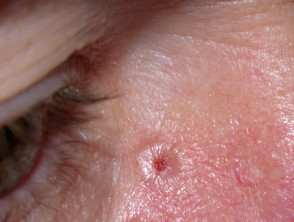DermNet provides Google Translate, a free machine translation service. Note that this may not provide an exact translation in all languages
Quiz
Nonmelanoma skin cancers – 10 cases
This quiz will test your diagnostic skills for nonmelanoma skin cancers.
The epidermis is made up of actively dividing cells, the keratinocytes. These are constantly exposed to environmental mutagens and immune modulating agents, particularly ultraviolet radiation. We have a genetically susceptible population with fair skin that burns easily and tans poorly yet enjoys an outdoor lifestyle. It is not surprising therefore that epidermal cell cancers are by far the most common of all cancers, estimated to account for 45,000 new cases in New Zealand each year.
Nonmelanoma skin cancer and its precursors are relatively easy to recognise, and straightforward to treat when small and/or located away from the mid-face and lower legs. Yet their management is sometimes complex, requiring extensive surgery or expensive non-surgical treatment for multiple and/or recurrent tumours. Early diagnosis of enlarging, spontaneously bleeding, ulcerated or scaly nodules and plaques is essential. Promote active primary and secondary prevention – stay in the shade, wear a broad-brimmed hat and covering clothing and apply broad spectrum SPF30+ sunscreen to otherwise unprotected skin.
For each of the ten cases, study the image(s) and then answer the questions. You can click on the image to view a larger version if required.
Each case should take approximately 2 minutes to complete. There is a list of suggested further reading material at the end of the quiz.
When you finish the quiz, you can download a certificate.
Case 1
Sign up to the newsletter
© 2024 DermNet.
DermNet does not provide an online consultation service. If you have any concerns with your skin or its treatment, see a dermatologist for advice.
